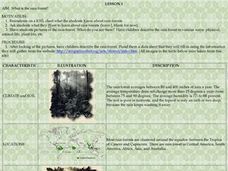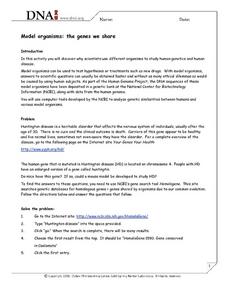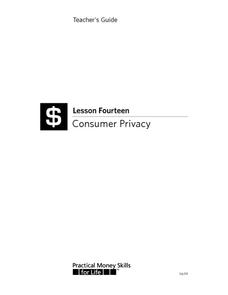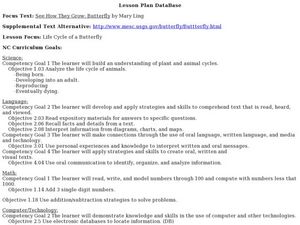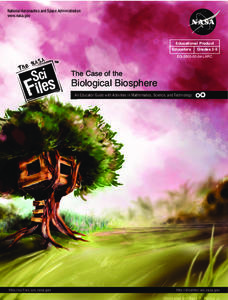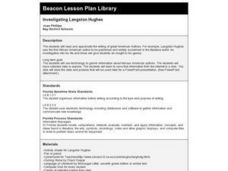Curated OER
World Population Activity II: Excel
Students import UNEP World population data/projections from either the World Population Prospects: The 2002 Revision Population Database - UN Population Division or a text file. They graph this data by itself, and then along with...
Curated OER
Look At Those Leaves!
Young scholars collect, observe, sort, and measure leaves. In this leaf lesson plan, students take a walk to collect leaves. They bring the leaves back into the classroom to observe, sort, and measure them. They visit a website to learn...
Curated OER
Teams in the Field
Students conduct team interviews outside the classroom, either within the school or beyond, as part of a fieldwork project. They use reasoning skills as they formulate questions, plan, predict, hypothesize, and speculate about the...
Curated OER
Health Education: Toxins
Student hear about harmful household products. For this personal health lesson plan, 3rd graders summarize why household products are harmful if ingested or inhaled.
Curated OER
What is the Rainforest?
Learners investigate rainforests. In this rainforest lesson, students brainstorm on a KWL chart about what they already know about the rain forest. Learners are shown pictures of the rain forest and describe what they see in the photos....
Curated OER
Right To Privacy?
Young scholars examine privacy issues. In this global issues lesson, students discuss privacy issues, surveillance cameras, and national identification cards. Young scholars conduct further research about the pros and cons related to...
Curated OER
Simple Thermodynamics of Transportation
Students watch videos about various modes of transportation, they examine the energy transformations that occur in each, and they be introduced to the laws of thermodynamics.
Curated OER
Cord Blood Banking and Transplantation
Students explore stem cells. For this stem cell lesson, students research print and Internet sources regarding types of stem cells and their attributes. Students discuss their research findings participate in a debate about cord blood...
Curated OER
George Washington - A Graphic Novel
Students write and illustrate their own graphic novels. In this George Washington instructional activity, students collaborate to research Washington's life as surveyor, his involvement in the French and Indian War as well as the...
Curated OER
Sanitarium Times
Students learn about the Sanitarium Times as they look into how they lived, what they ate, how they were entertained, etc... In this Sanitarium Times lesson, the students do research and create papers as well as look for living members...
Curated OER
Space: The Final Frontier
Sixth graders construct a graph to demonstration information that they've learned about the solary system. They also write or illustrate a sonar or lunar eclipse.
Curated OER
Model Organisms: The Genes We Share
In this genetics activity, students access a website to learn about how human genes mutate to cause heritable disorders such as Huntington disease. Students use the information on this website to complete 12 short answer questions.
Curated OER
Mound Cities
Young scholars learn about Mound Cities and how they both started and stopped. In this Mound instructional activity students explore how Mound Cities did not succeed and why. Young scholars dig deeper then the instructional activity as...
Curated OER
Links to the Missing
Students investigate the information required to identified missing persons, then create a personal 'database' of information on themselves and their community.
Curated OER
Arts Directors
Students reflect on a personally meaningful live performance and the circumstances necessary to create art. They study about the current leadership crisis facing the Met, Carnegie Hall, and the Public theater. In groups, students...
Visa
Consumer Privacy
The availability of personal financial information is of greater importance now than ever before. Your pupils will discuss how public and private records are accessed by various organizations, particularly considering direct mail, credit...
Curated OER
Identifying Fossils
Students create model fossils. In this fossils instructional activity, students view pictures of fossils and compare and contrast these fossils. Students read about fossils and create a database chart with the facts they learn. ...
Curated OER
Career Exploration
Students complete a unit about career choices. They conduct research on a selected career that interests them, conduct an interview, explore various websites, create a five-page HyperStudio stack, and write ten checks that relate to...
Curated OER
Finding Historical Evidence: David Brion Davis
Students study the Tran-Atlantic Slave Trade and learn to evaluate historical arguments. In this slave trade lesson, students read about the Atlantic Slave System. Students take notes on slave trade and make a timeline for the...
Curated OER
Gaining Insight into the WWII Era Through Electronic Records and the National Archives
Students are introduced to the variety of resources that are available to them online with regards to national archives and enlistment records. Individually, they use the database to find someone they know who enlisted before or during...
Curated OER
See how They Grow: Butterfly
Young scholars view butterflies and participate in a butterfly activity to learn needed vocabulary. In this butterfly life cycle lesson, students access prior knowledge of butterflies. Young scholars listen to a butterfly life cycle...
Curated OER
The Tropical Rain Forest
Young scholars use various web sites to access information about the rain forest. They use the Tropical Rainforest Interactive CD to make their own rain forest pictures and stories and learn facts about the rain forest. They use various...
Curated OER
The Case of the Biological Biosphere: Health, Math, Technology
Students investigate various aspects of the human body in this imaginative Tree House Detective episode about the biological biosphere. In a series of They take measurements, analyze data, and use technology. The lessons revolve around...
Curated OER
Investigating Langston Hughes
Third graders read and appreciate the writing of great American Authors. use technology to garner information about famous American authors. They have selected sites to explore. The information they save be used for a future Powerpoint.






